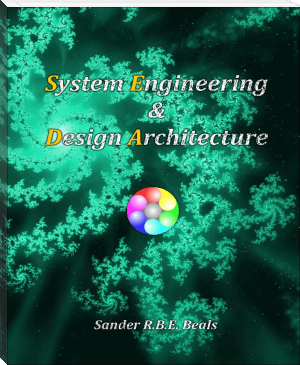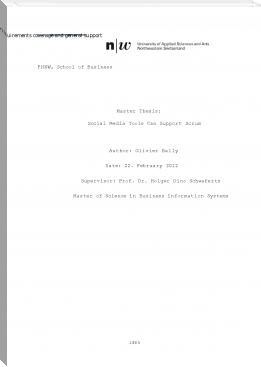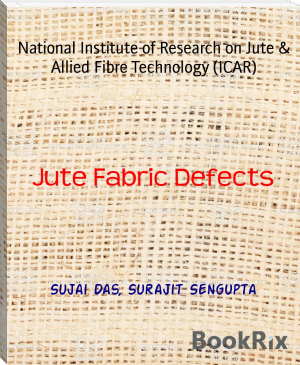System Engineering & Design Architecture - Sander R.B.E. Beals (books to get back into reading txt) 📗

- Author: Sander R.B.E. Beals
Book online «System Engineering & Design Architecture - Sander R.B.E. Beals (books to get back into reading txt) 📗». Author Sander R.B.E. Beals
This may be a pipe dream which will never surface, or it may just be what naturally emerges from this book. We'll see in a while, I guess. Point is, I want to know the architecture that is generic across all of our environment, in order to be able to define a system that is able to adapt to it in a meaningful way. Just call it my personal addiction.... ;-) On the other hand, it is much like the discussion between Palmer and Ellie in Contact, which went more or less like this:
Ellie: (quoting Palmer's book) "Ironically, the thing that people are most hungry for, Meaning, is the one thing science hasn't been able to give them."
Palmer: "Yeah, Yeah..."
Ellie: "Come on! It is as if you are saying that science killed God! But what if science simply revealed that he never existed in the first place?"
Palmer: "I think we're gonna need some air, and a few more of these....(pointing at his champagne)"
(a few lines bring the subject to Occam's Razor....)
Ellie: "So what's more likely: an all powerful God created the Universe, and then decided to leave no proof of His existence, or that He simply doesn't exist at all, and that we created Him so we wouldn't have to feel so small and alone?"
Palmer: "I don't know, I couldn't imagine living in a world where God didn't exist. I wouldn't want to. "
Ellie: "How do you know you're not deluding your-self? Me, I'd need proof!"
Palmer: "Proof? Did you love your father?"
Ellie: "What!?"
Palmer: "Your Dad. Did you love him?" (notice the needle pointing upwards?)
Ellie: "Yes.... very much!"
Palmer: "Prove it!" (thanks to Warner Brothers, for bringing this to the light)
Now that is the very same feeling I have: I can't prove any of my writings, but to me they are absolute knowledge, or at least common sense like Occam's Razor. And that problem solving mechanism it not mine to design, but merely to uncover, to make known its existence: you might call it God or any other name, but I simply enjoy its presence, as I know it does mine!
Right this minute, the movie 'Swordfish' showed me the scene where Stanley walks in on Ginger in her lingerie, and clearly showing her wire: sure, she's a bit to wiry for my taste, but that wasn't the wire I was talking about. It was more a wire that taped conversations she had with Gabriel, the movies ultimate 'bad' guy! Did you ever notice how the user interfaces shown in our movies are lightyears ahead of the ones we are using? They downplay the influence of just data over the more presentational aspects of the interface, in order to obfuscate the meaning of the data on screen. We viewers enjoy these images, since they are only partially essential to the story, but meanwhile, our subconscious is picking up every little bit of it! Yes, it's the patterns that make the movie, just like the notes make the music. Weird to just hear how Gabriel goes on about Houdini, and his misdirections which made him the unbeatable escape artist that he was: Did I just hear real envy sound through his voice?
Well, my envy has always been aimed at a feat I figure to be the absolute counterpart to misdirection: figuring out the biggest mystery of all, and being able to explain it to anyone in simple everyday language. Now I might call this a problem, in which case I would have to become a problem solver in order to make this happen. But the fact is, that I've always been a problem solver, for as long as I can remember. It is the essence of my being. Still though, that is a mere label, a tag that designates only one of my talents. And like any human, I don't have just one talent.....
In fact, my 'business' card now lists three: the first of them is a way more positive term than Problem Solver, where most people tend to look at it and immediately focus on 'Problem' as being the imperative word here. And this of course fits perfectly with the speech that Gabriel gives to Stanley about 'the Greater Good'. We may agree or not, but it is all about perceptions.
Just like the North Am Robotics salesman in Bicentennial Man (which I'm now watching) is just showing his problem-oriented approach towards Andrew's 'personality disorder'. Where Andrew's owner sees it as unique, the salesman just fears the effect of Andrew's behavior on his client base, and he sees it in fear: if more robots act like that, he fears that they might become violent in case they succeed in overcoming the restriction of the three laws, thus dropping his shares down the toilet....
But still, this book would not be finished if it didn't also provide something constructive beside the obvious highschool level talk about Systems interactions. So let's dedicate the rest of it to flesh out a new system of software development, that may in fact even urge us to also redefine the architecture of computer hardware. Maybe this has all already been operating for many years in our rather rigid concept of Time, but from where I sit we are still stuck with the work of herr von Neumann....
But as Gabriel said just now: "Audiences love happy endings". That he actually meant it to be his flawless escape masked by the observation of his death by identification of a nameless corpse in an incorrect way was just a hint at his mastery of misdirection.
Skip forward, to todays proof reading: Rush just came onto my 5.1 Dolby surround stage with "Between the Wheels". And this talks about perceptions as well: "You know how that rabbit feels, going under your spinning wheels..." And in fact you do! I know I do... I may not speak for all, but I've experienced that feeling for myself: my car at over 180 kilometers per hour in the dead of night, and then suddenly seeing two bright spots dead ahead. That poor cat could have gotten away, but I was in no position to avoid it without my mechanical friend being trashed into a million pieces, and me and my wife along with it!
So no, it doesn't always end happy, but it does give you stuff to use whenever possible to turn things around...
Of course we shouldn't forget the alternative of acquisition: if the problem is solvable, someone will probably have solved it already, and we may seek to acquire their help in solving it for us as well. Now that requires an exchange of information or other tangible things, which in itself is a mechanism requiring three SevenSpheres to map it out decently. Let's start with the situation where we are looking for something not advertized to death: no cell phone, but a second hand car. Lots of sites offer them, but the trick is in finding one that meets your requirements:
Do we know the requirements of the intended solution to our problem? Is it a diesel, certain type of car, brand or other distinguishing features? If we're not clear on that, let's reflect some more in the light blue sphere, or just browse around in the next sphere to figure out which criteria to add.
Now we are shortcycling the blue, purple and red sphere, as we evaluate the various offers: while looking at an offer, we consider the requirements it meets, and those it doesn't: any set of requirements may make it desirable, but only select ones make it far out or too far out! You favorite color could be the first case, while too much mileage could kill your interest in the car like a veto would break a near unanimous decision in the United Nations building!
But one candidate does not make the total offer on display: we simply go to the yellow sphere, and find the next one, even adjusting our preferences over time in order to find the right choice.
Only once a Valid Candidate has passed the fiery test of the top sphere, does it fall into the green category of Solid Candidates. From then on we go on to the next SevenSphere altogether, which deals with Acquisition (the foremost concept to infest the Ferengi mind...)
Here is an example of where our mind sometimes makes a difference, from one step to the next: where in the previous mindset it used to be a Solid Candidate, the buyers mind (mine in this case) switched it back to a 'Viable Candidate'. We do this, because we don't want to seem too anxious to acquire it, thus giving away our edge during the negotiations. Still though, this is a perfect example of how our view shifts the moment we jump from one SevenSphere to the next. The other phases are quite clear I feel, so I won't bother you with blow by blow descriptions of something you've all done countless times...
The one thing that does need mentioning though, is the double red meaning of the top spheres: they are both the danger and the desire, and as such determine just how much effort we want to put in that area. Me personally, I either go for what is free, or pay the asking price without haggling: if it was a solid candidate in my selection sphere, it is just as solid when I arrive in the sphere of acquisition.
Which brings me to the concept of selling the stuff that needs to be sold: it is the area where traders meet heavy competition because everybody sees a market in there, and everybody wants a piece of the action. With that, a joke from my youth comes to mind: “two shoe salesmen arrive in a country somewhere in Africa, and they watch the people go by. The first one sees the people, and immediately exclaims: “Man, I'm not going to make one sale here: no one wears shoes in this place!” The other one smiles and says: “Yeah, that's the point “nobody has shoes here yet!!!”
And thus we come to advertizing. Like I said, sometimes we're so deep in it that we don't see the obvious. It took me an hour while observing my neighbor shop for a new secondhand car on the Web, in order for me to see the mechanism of selection and acquisition made clear to me by mere





Comments (0)